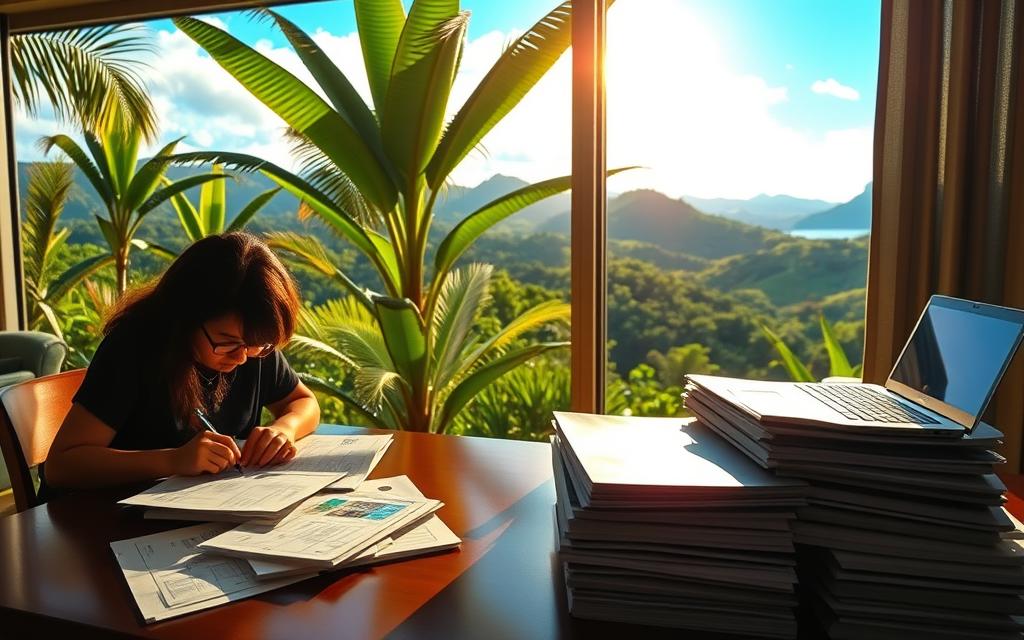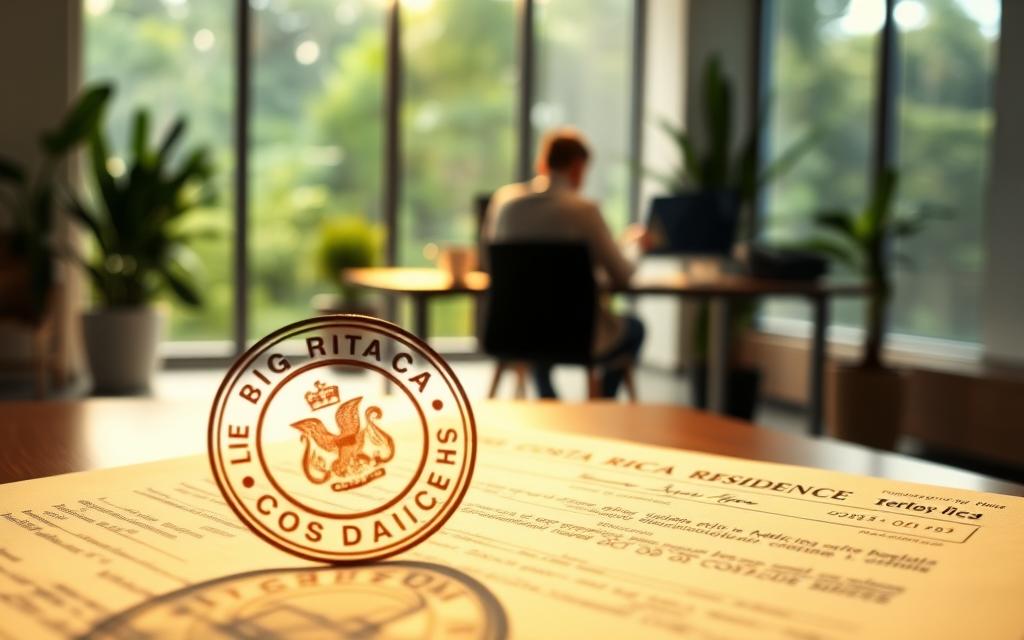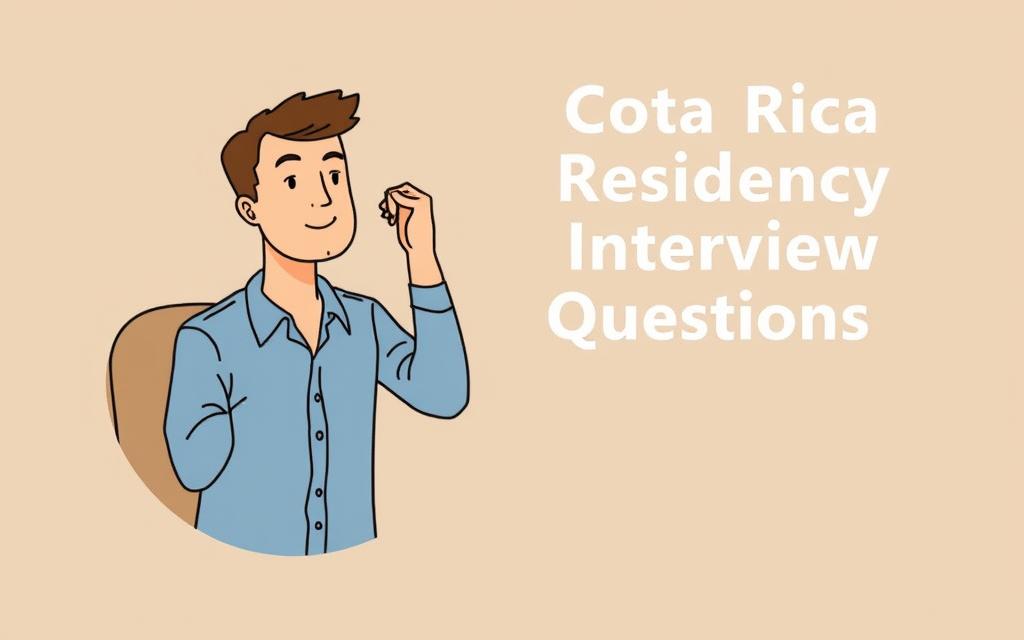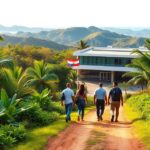Costa Rica Residency Interview Questions Explained

For individuals and families seeking a better quality of life, Costa Rica has emerged as an attractive destination. Known for its natural beauty and rich culture, this Central American country offers a welcoming environment for those looking to settle.
The residency interview is a critical step in the application process. Many applicants find it intimidating due to uncertainty about the types of questions that will be asked. Understanding what immigration officials typically ask can significantly increase the chances of a successful application.
We will walk you through the most common interview questions, providing insights on how to prepare and respond effectively, covering personal background, financial stability verification, and documentation requirements.
Understanding the Costa Rica Residency Process

To navigate the Costa Rica residency process effectively, it's essential to know the different types of residency available. Costa Rica offers a variety of residency options to suit the needs and circumstances of applicants. We will explore these options and the timeline for the application process.
Types of Residency Options in Costa Rica
Costa Rica provides several residency categories, including rentista residency for those with stable and sufficient income, investment residency for individuals who wish to contribute to the country's development through business investment, and permanent residency, which allows foreigners to live indefinitely in Costa Rica after meeting specific legal requirements. Each category has its own set of requirements and benefits.
Understanding these options is crucial for selecting the one that best fits your situation. The rentista category, for example, is ideal for retirees or individuals with a steady income from outside Costa Rica.
Timeline for Residency Application Processing
The processing time for Costa Rica residency applications varies significantly based on the application category, the completeness of the documentation, and the current workload at immigration offices. Generally, the process takes between 3 to 12 months from the time all required documents are submitted and accepted.
The interview is typically scheduled within 1 to 3 months after the initial application submission, depending on the backlog at immigration. After a successful interview and approval, it usually takes another 2 to 3 months to receive the DIMEX (Documento de Identidad Migratorio para Extranjeros) residency card.
It's also important to note that applications with missing or incorrect documentation will face significant delays. Proper preparation before the interview is crucial to avoid such issues. Understanding the timeline helps in setting realistic expectations and planning for your residency process.
Preparing for Your Costa Rica Residency Interview

Understanding the requirements and procedures for your Costa Rica residency interview can significantly enhance your chances of success. As we guide you through this process, we'll cover the essential aspects to help you prepare effectively.
When and Where Interviews Take Place
Interviews for Costa Rica residency are typically conducted at the immigration office in San José. The exact location and time will be specified in your interview appointment letter or email confirmation, which you must bring with you to the interview. It's crucial to arrive on time, as missing your scheduled interview can lead to delays in your application process.
The scheduling of interviews depends on various factors, including the type of residency you're applying for and the current workload of the immigration office. Generally, you'll receive notification of your interview date and time a few weeks in advance.
What to Bring to Your Interview
Bringing the correct documents to your Costa Rica residency interview is vital for a successful outcome. Essential items include your valid , all original documents submitted with your application, and their respective translations if not in Spanish. Ensure your passport is valid for at least six months beyond your intended stay in Costa Rica.
Other critical documents to bring include:
- Your interview appointment letter or email confirmation.
- Proof of financial solvency, such as bank statements or pension verification, relevant to your residency category.
- Multiple copies of all documents, as immigration officials may request additional copies.
- Recent passport-sized photographs, even if you've already submitted some with your application.
- Your medical examination results in a sealed envelope, if applicable.
- Proof of payment for all application fees and a credit card for any additional fees that may arise.
By being thoroughly prepared with the necessary documents and information, you can confidently navigate your Costa Rica residency interview and move closer to achieving your residency goals.
Common Costa Rica Residency Interview Questions

As you prepare for your Costa Rica residency interview, it's essential to familiarize yourself with common interview questions. The interview is a critical step in the residency application process, and being prepared can make a significant difference in your experience.
Personal Background Questions
During the interview, you can expect questions about your personal background. These may include inquiries about your education, work history, and family. Be prepared to provide detailed information about your background and how it relates to your application for residency in Costa Rica.
Questions About Your Ties to Costa Rica
The interviewer will also ask questions to assess your ties to Costa Rica. This could include questions about your reasons for choosing Costa Rica, your plans for living there, and any connections you have in the country. Demonstrating a genuine interest in and connection to Costa Rica can strengthen your application.
Financial Stability Questions
Financial stability is a crucial aspect of the residency application, and you should be prepared to answer questions related to your financial situation. You may be asked about your income sources, bank statements, and overall financial health. For example, you might be asked, "How will you support yourself in Costa Rica?" or "What is your monthly income?" Having clear, organized financial information readily available can help you answer these questions confidently.
To prove financial stability, applicants must demonstrate a reliable income or financial resources. This may involve providing bank statements, proof of pension or investment income, or other financial documents. Ensuring you have a clear understanding of your financial situation and can articulate it effectively during the interview is vital.
How to Answer Questions About Your Residency Category

When applying for residency in Costa Rica, understanding the category-specific questions can make a significant difference in your application's success. The residency category you apply under, whether it's Rentista, Pensionado, or Inversionista, will determine the types of questions you'll be asked during the interview.
Rentista Residency-Specific Questions
For Rentista residency applicants, the interview will focus on your financial stability and ability to support yourself without working in Costa Rica. Be prepared to discuss your income sources, financial documents, and how you plan to maintain your lifestyle in the country.
Pensionado Residency-Specific Questions
Pensionado applicants should be ready to answer questions about their pension, including the source of their pension, the amount they receive, and how it is adjusted for inflation. Officials may also inquire about your ties to Costa Rica and your plans for living there.
Inversionista Residency-Specific Questions
Inversionista, or investor, residency applicants should prepare for detailed questions about their investment in Costa Rica. This includes describing the investment in detail, explaining how it benefits the country's economy, and discussing their role in managing the investment. Officials may also ask about the legal structure of the investment, business plans, projected returns, and employment creation potential.
Understanding the specific requirements and expectations for your chosen residency category is crucial for a successful application. By being well-prepared to answer category-specific questions, you can demonstrate your commitment to complying with Costa Rica's laws and regulations, enhancing your chances of a successful residency application.
Documentation Questions During the Interview

One of the critical aspects of the Costa Rica residency interview is the scrutiny of your submitted documents. Immigration officials will thoroughly review your paperwork to ensure authenticity and accuracy, asking questions to verify the information provided.
Explaining Missing or Incomplete Documents
If you are missing documents or if some are incomplete, be prepared to explain the reasons. Officials may ask for additional information or clarification on certain documents. It's crucial to be honest and provide any supporting evidence that can validate your explanations. For instance, if a document was issued with an error, you should be ready to explain the steps you've taken to correct it.
Handling Document Verification Questions
Immigration officials may ask detailed verification questions about your documents, such as "Can you confirm when and where this document was issued?" or "Can you explain this notation on your birth certificate?" Be prepared to describe the process you followed to obtain certain documents, especially those from foreign governments or institutions. Understanding both the original content and any translated versions of your documents is also essential, as officials may ask questions about translations or authentications, like apostille or consular authentication.
To navigate these questions confidently, it's vital to have a thorough understanding of the information contained in your documents. This includes being able to explain any amendments, corrections, or unusual markings. By demonstrating transparency and the legitimacy of your application through your answers, you can facilitate a smoother interview process.
Medical Examination and Health-Related Questions

As part of the Costa Rica residency application process, a thorough medical examination is required to assess an applicant's health status. This examination is crucial for determining the applicant's eligibility for residency.
Required Medical Tests Explained
The full medical examination includes a review of the applicant's medical history, a physical examination, and various tests such as a chest X-ray, gonorrhea test, and blood tests for applicants 15 years of age or older. Additionally, Tuberculosis (TB) testing is mandatory for all applicants two years of age and older. These tests are designed to provide a comprehensive overview of the applicant's health.
Applicants should be prepared to discuss their medical history, including any medications they are currently taking and ongoing treatments they are undergoing. This information is vital for the residency application process.
Addressing Health Concerns in the Interview
If the medical examination reveals health concerns, applicants should be prepared to address these professionally during their residency interview. Common questions may include explanations of notations in medical reports, management of health conditions, and the need for specialized treatment in Costa Rica.
Applicants should also be ready to discuss their health insurance coverage, plans for managing ongoing medical care in Costa Rica, and their understanding of Costa Rica's healthcare system. Questions about communicable diseases are particularly important, as they can impact residency eligibility.
For applicants with disabilities or chronic conditions, it's essential to explain how these conditions will not hinder their ability to be self-sufficient in Costa Rica. Bringing relevant documentation about health insurance and treatment plans can demonstrate preparedness and responsibility.
Family-Related Interview Questions
When applying for residency in Costa Rica, family-related questions are a crucial part of the interview process. Officials need to assess the authenticity of the applicant's family situation, particularly for those applying through marriage to a Costa Rican citizen or for those with dependents.
Questions About Dependents and Spouses
Applicants with spouses or dependents can expect detailed questions about their family dynamics. Officials will ask about the spouse's daily routines, financial responsibilities, and future plans as a couple. Both spouses must attend the interview, where they will be assessed through separate and joint questioning to verify the authenticity of their relationship.
Common questions include: "How did you meet your spouse?" and "Describe your wedding ceremony." Officials may also inquire about the applicant's relationship with their in-laws and their Costa Rican spouse's extended family.
Marriage to Costa Rican Citizens Questions
For those applying through marriage to a Costa Rican citizen, the scrutiny is even more intense. Officials will ask about previous marriages or relationships to verify there are no impediments to the current marriage. It's crucial to understand that marriages suspected of being arranged solely for immigration purposes receive extra scrutiny.
Maintaining the marriage for at least two years is vital, as divorce during this period can result in losing residency rights. Therefore, it's essential to be prepared to answer questions about your marriage honestly and thoroughly during the interview.
Navigating Language Barriers During the Interview
When applying for Costa Rica residency, a significant hurdle for many applicants is overcoming the language barrier during the interview process. Effective communication is key to a successful interview, and we will explore how to navigate this challenge.
Using an Interpreter Effectively
Applicants who are not proficient in Spanish or English have the option to bring one interpreter to assist during the interview. It's crucial to choose an interpreter who is not only fluent in the relevant languages but also familiar with the residency application process. This ensures that the interpreter can accurately convey the applicant's responses and understand the questions posed by the interviewer.
Basic Spanish Phrases to Know
Learning basic Spanish phrases can significantly enhance the interview experience. Simple greetings like "Buenos días" (Good morning) and "Gracias por su tiempo" (Thank you for your time) demonstrate respect for the culture. Phrases such as "No entiendo" (I don't understand) and "Puede repetir, por favor" (Can you repeat, please) can be particularly useful. Additionally, practicing the pronunciation of personal details and basic vocabulary related to the residency category can facilitate a smoother interview.
Addressing Criminal Record and Background Check Questions
Understanding how to address criminal record and background check questions is vital for a successful Costa Rica residency interview. As part of the application process, you'll need to provide police certificates from your current and previous countries of residence, which will be scrutinized during the interview.
How to Explain Past Legal Issues
Be prepared to discuss any past legal issues and the process you followed to obtain police certificates from each required country. It's essential to be transparent about your history, as officials may ask about gaps in your residence history to ensure you've provided certificates from all relevant jurisdictions. For more information on the legal requirements for Costa Rica residency, you can visit this resource.
Police Certificate Requirements and Questions
Police certificates are mandatory documents for Costa Rica residency applications. You'll need to provide the original police certificate from your country of current residence and countries of previous residence if you're over 18 years old. Costa Rican police certificates are only valid for three months, so timing your application submission is crucial. Be ready to explain any notations or codes on your police certificates, as officials may ask for clarification.
Financial Requirement Questions and Verification
During the Costa Rica residency interview, your financial documents will be thoroughly examined. This scrutiny is a critical part of the application process, ensuring that applicants meet the necessary financial requirements for their chosen residency category.
Proving Income and Financial Stability
To demonstrate financial stability, applicants must provide comprehensive documentation, including bank statements and proof of income. Officials may ask specific questions about transactions, account balances, and patterns shown in the statements.
It's essential to be prepared to explain the source of large deposits and the purpose of significant withdrawals. Clarity on these matters helps to establish transparency and credibility.
Bank Statement and Financial Document Questions
Bank statements are a crucial part of the financial verification process. Officials may inquire about account ownership, especially for joint or business accounts, and ask about currency conversion rates and their impact on meeting the minimum financial requirements.
Applicants should be ready to discuss their banking relationships, including the duration of their accounts and their standing with financial institutions. Questions about financial transfers to Costa Rica and plans for banking in the country are also common.
Understanding the specific financial documentation requirements for your residency category is vital. This knowledge helps you prepare for targeted questions and demonstrate that you meet the necessary financial criteria.
Questions About Your Plans in Costa Rica
Immigration officials in Costa Rica are keen to understand your long-term plans and how they align with your residency application. As part of the interview process, you will be asked to discuss your future intentions, including your reasons for moving to Costa Rica and your plans for integrating into the local community.
Explaining Your Reasons for Moving
When explaining your reasons for moving to Costa Rica, be prepared to discuss what attracted you to the country. This could include its natural beauty, cultural heritage, or business opportunities. Highlighting your genuine interest in becoming a part of the Costa Rican community will strengthen your application. You may be asked about your previous experiences in the country, such as visits or work assignments, and how these experiences have influenced your decision to apply for residency.
Discussing Your Long-Term Plans
Your long-term plans are a critical aspect of your residency application. Be prepared to discuss your professional or retirement goals, as well as any plans you have for contributing to the local economy. This might include starting a business, investing in property, or participating in community activities. Immigration officials want to understand your vision for your future in Costa Rica and how you plan to integrate into society. For example, you might discuss your plans for learning Spanish, joining local organizations, or volunteering.
By demonstrating a clear understanding of your long-term plans and how they align with your residency application, you can show your commitment to making Costa Rica your home.
Potential Red Flags and How to Address Them
To succeed in your Costa Rica residency interview, you need to be aware of the common pitfalls and know how to address difficult questions. Immigration officials may ask challenging or unexpected questions to test your preparedness and honesty. Being aware of these potential red flags can help you prepare and increase your chances of a successful outcome.
Common Application Mistakes to Avoid
One of the most significant red flags is having an incomplete or inaccurate application. To avoid this, ensure that all required documents are submitted and that the information provided is consistent and truthful. Common mistakes include missing signatures, incorrect dates, and incomplete forms.
Another potential issue is providing inconsistent information across different documents or during the interview. To mitigate this risk, review your application carefully before submission and be prepared to explain any discrepancies during the interview.
Handling Difficult or Unexpected Questions
When faced with difficult or unexpected questions, remain calm and composed. If you don't know the answer to a question, it's better to acknowledge this directly rather than guessing or providing misleading information. Take a moment to gather your thoughts before responding to complex questions.
If a question seems irrelevant or intrusive, remain respectful while politely asking for clarification about its relevance to your application. For hypothetical scenarios, consider the underlying concern the official is addressing and respond thoughtfully to that core issue.
By being aware of these potential red flags and knowing how to address them, you can demonstrate your integrity and suitability as a potential resident, increasing your chances of a successful outcome in your Costa Rica residency interview.
Post-Interview Process Explained
The post-interview process is a critical phase in your Costa Rica residency journey. After you've completed your interview, the immigration authorities will begin reviewing your application.
What Happens After Your Interview
After your interview, the immigration department will process your application. The timeline for receiving a decision on your Costa Rica residency application typically ranges from 3 to 12 months, depending on your residency category and application complexity.
Pensionado and Rentista applications generally process faster than Inversionista or family relation categories due to their standardized requirements.
Timeline for Decision and Next Steps
Once your application is approved, you'll receive notification to schedule an appointment to obtain your DIMEX residency card at the immigration office. At this appointment, you'll need to pay the residency card fee, provide fingerprints, and have your photograph taken for the card.
After receiving your DIMEX, you must register with the Costa Rican Social Security system within 30 days, which is a legal requirement for all residents. You can find more information on the process and requirements on the official immigration website or through a reliable source such as Jaros CR.
Understanding these next steps helps you prepare for the transition from applicant to legal resident. Your residency approval comes with both rights and responsibilities in Costa Rica, including regular renewal requirements.
Working with a Residency Attorney or Consultant

To ensure a smooth residency application experience, consider working with a qualified attorney or consultant. The process of obtaining residency in Costa Rica can be complex, involving numerous documents and strict requirements.
Benefits of Professional Assistance
Professional assistance can significantly enhance your residency application experience. A qualified consultant or attorney provides valuable expertise, ensuring that your application is complete and accurate. They can help you navigate the specific requirements for your residency category, whether you're applying as a rentista, pensionado, or inversionista. With their experience, you can avoid common pitfalls and increase the likelihood of a successful application.
What to Look for in a Residency Consultant
When selecting a residency consultant or attorney, several factors are crucial. Look for professionals who specialize in Costa Rica immigration law, as they will have the necessary expertise. Verify their experience with your specific residency category, as requirements can vary significantly. Check for professional credentials, such as legal licensing or membership in recognized immigration consultant associations. Additionally, consider their bilingual skills, reputation, and communication style to ensure they can effectively represent you throughout the process.
Renewing Your Residency: Interview Questions and Process
As your Costa Rica residency approaches its renewal date, it's crucial to understand the interview process and potential challenges. Renewing your residency involves more than just submitting documents; it requires a thorough understanding of the renewal process and the ability to address interview questions effectively.
There are two primary options for renewing your residency ID card: through the Banco de Costa Rica or directly at the immigration offices. In both cases, you'll need to submit your registration with the Costa Rican Social Security and a criminal record issued by the OIJ of Costa Rica. Some residency regimes have special requirements, so it's essential to check the specific needs for your category.
Differences Between Initial and Renewal Interviews
The renewal interview differs significantly from the initial interview. While the initial interview focuses on your background, financial stability, and reasons for moving to Costa Rica, the renewal interview assesses your continued eligibility and compliance with the residency requirements. You may be asked about your time spent in Costa Rica, updates to your financial situation, and any changes in your personal circumstances.
Common Renewal Application Challenges
Several challenges can complicate the Costa Rica residency renewal process if not addressed proactively. These include insufficient time spent in Costa Rica, lapsed Caja payments, failure to file required tax declarations, changes in financial circumstances, expired supporting documents, missing the renewal deadline, and changes in marital status or family composition. Being aware of these potential issues can help you prepare and avoid complications.
To ensure a smooth renewal process, it's vital to stay informed about the requirements and potential challenges. By understanding the differences between the initial and renewal interviews and being prepared to address common renewal application challenges, you can navigate the process more effectively.
Conclusion
As you prepare for your Costa Rica residency interview, understanding the process and potential questions is key. Successfully navigating your Costa Rica residency interview requires thorough preparation, a clear understanding of the process, and effective communication of your qualifications and intentions.
By familiarizing yourself with common interview questions across various categories, you can approach your interview with confidence. Remember, immigration officials are primarily concerned with verifying your eligibility for your chosen residency category and your genuine intention to reside in Costa Rica.
For additional assistance with your residency process, consider reaching out to professionals who can guide you through the complexities. You can contact Jaros CR at info@jaroscr.com or +(506)7182-8969, or visit www.jaroscr.com for more information.


